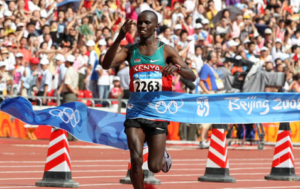For a long time, 98 athletes, honed by rigorous training, burst onto Tiananmen Square to start running all at once. Their goal was to cover a distance of 42.195Km and reach the final finish line. After 2 hours, 6 minutes, and 32 seconds, Samuel Wanjiru of Kenya, who had led the race with astonishing speed from the start, was the first to cross the finish line. 44 seconds later, Jaouad Gharib of Morocco finished in second place. This is the story of the marathon at the 2008 Beijing Olympics.

The Beijing Olympic marathon winner, Wanjiru, received not only a gold medal but also a laurel wreath made from branches of an olive tree, which has a history of 2500 years. Wanjiru’s record of 2 hours, 6 minutes, and 32 seconds remains an Olympic record. Meanwhile, the record of Jaouad Gharib, who finished second with a time of 2 hours, 7 minutes, and 16 seconds, would have been an Olympic record if not for Wanjiru. The difference of just 44 seconds determined the gold and silver medals, and Wanjiru’s name will be remembered for a long time.
Competition exists everywhere, at all times, and there are always winners and losers, with the latter far outnumbering the former. Moreover, the outcomes determined by the margin of competition can be disproportionately harsh compared to the actual difference in abilities. A single question can determine college admission success or failure, and a single answer can decide whether one gets a desired job or remains unemployed. Just like in the natural ecosystem, where the difference can be between life and death, the disparity between winners and losers in human society is also extreme.

답글 남기기